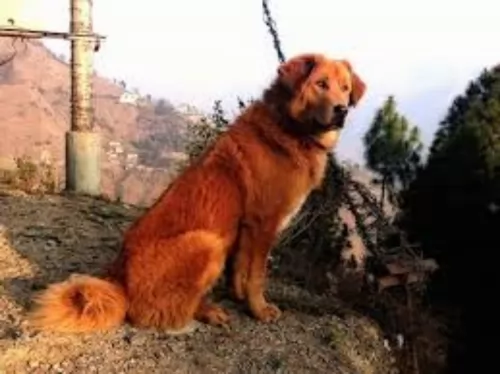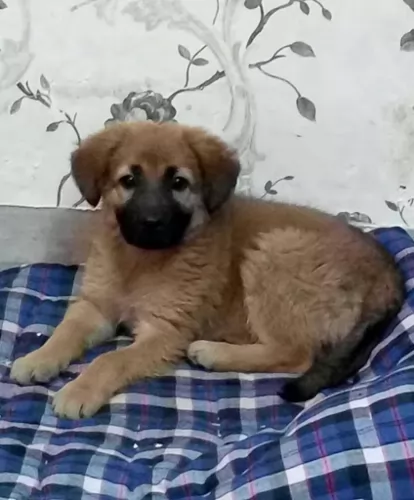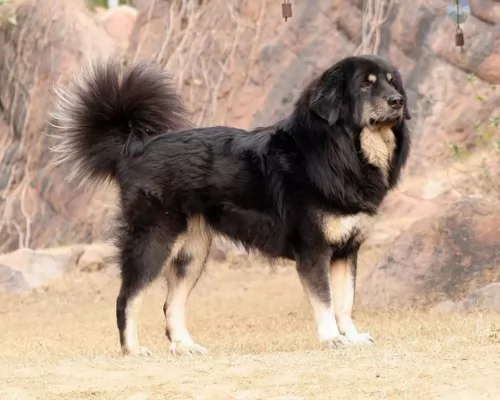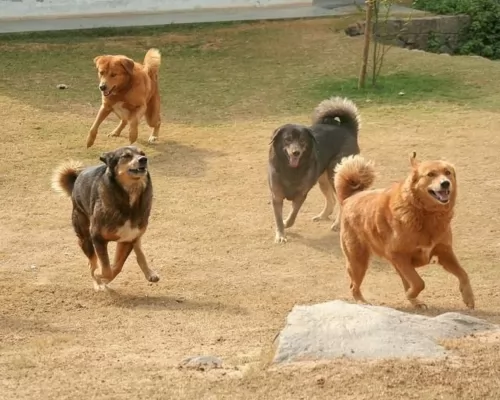 Petzlover
Petzlover Hellenic Hound is originated from Greece but Himalayan Sheepdog is originated from India. Hellenic Hound may grow 16 cm / 6 inches shorter than Himalayan Sheepdog. Hellenic Hound may weigh 25 kg / 55 pounds lesser than Himalayan Sheepdog. Both Hellenic Hound and Himalayan Sheepdog has almost same life span. Both Hellenic Hound and Himalayan Sheepdog has almost same litter size. Hellenic Hound requires Low Maintenance. But Himalayan Sheepdog requires High Maintenance
Hellenic Hound is originated from Greece but Himalayan Sheepdog is originated from India. Hellenic Hound may grow 16 cm / 6 inches shorter than Himalayan Sheepdog. Hellenic Hound may weigh 25 kg / 55 pounds lesser than Himalayan Sheepdog. Both Hellenic Hound and Himalayan Sheepdog has almost same life span. Both Hellenic Hound and Himalayan Sheepdog has almost same litter size. Hellenic Hound requires Low Maintenance. But Himalayan Sheepdog requires High Maintenance
 Developed in Southern Greece, the Hellenic Hound was bred to hunt hare and is an ancient breed. It is a medium sized breed with strong scent and tracking skills. It is believed to have been in existence for thousands of years. The ancestry of the breed included the Lagonikoi or laconikoi, native to southern Greece in ancient times. The breed was spread by sailors on Greece trading ships and colonization.
Developed in Southern Greece, the Hellenic Hound was bred to hunt hare and is an ancient breed. It is a medium sized breed with strong scent and tracking skills. It is believed to have been in existence for thousands of years. The ancestry of the breed included the Lagonikoi or laconikoi, native to southern Greece in ancient times. The breed was spread by sailors on Greece trading ships and colonization.
Todays Hellenic Hound is found throughout Europe. Kept somewhat isolated by the mountains, the breed was protected from outside breeding and they remained pure for centuries. It is a fearless, smart and hyped up purebred. The Hellenic Hound needs to have a job and if you don’t give him one, he will find one. He is smart and independent which sometimes makes him stubborn. It also takes this dog longer to mature than others, sometime between two and three years. It is not good for first time owners. Today’s hound is still a popular hunting dog and companion animal as well. They are rarely seen outside of the Greek country.
In 1996 the Hellenic Hound was recognized as the first Greek dog breed into the FCI. They are not recognized by the AKC. Its numbers continue to decline.
 The Himalayan Sheepdog comes from Nepal originally and was bred as a guardian for livestock. The exact location where the breed comes from is not documented well but it is thought that they come from North India and Nepal and they are rare outside of that area. They are a mountain dog – close in ancestry to the Himalayan Mastiff, and the Kinnaur Sheepdog of Tibet (Himalaya). All these Himalayan mountain dogs were all called “Gaddi dogs”. The term was used for all the large dogs no matter what their breeds actually were.
The Himalayan Sheepdog comes from Nepal originally and was bred as a guardian for livestock. The exact location where the breed comes from is not documented well but it is thought that they come from North India and Nepal and they are rare outside of that area. They are a mountain dog – close in ancestry to the Himalayan Mastiff, and the Kinnaur Sheepdog of Tibet (Himalaya). All these Himalayan mountain dogs were all called “Gaddi dogs”. The term was used for all the large dogs no matter what their breeds actually were.
The Himalayan Sheepdog is called by various names depending on where they were from. They are called Gaddi Leopardhund in Himachai Pradesh, In Nepal they are known as Bhote Kukkur or Bhotiya. Then there are Chamba Gaddi dogs. They are an ancient breed that existed before documentation on breeds was kept.
They acted as both guardians and herders. They guarded the mountain men’s encampments as well as the livestock. They were also used at times to hunt large animals. Today they are found only within Nepal and India. These Himalayan Sheepdogs are on the verge of extinction in India. There are no breeding programs and their isolation has caused the dilution of the gene pool. It is not recognized by any clubs including the UKC and the AKC.
 Today’s Hellenic Hound is not a big dog but rather very average or medium. It is an athletic dog and looks like it. It has a balanced body with a deep chest and thick neck. It has medium height legs that are strong and muscular with paws that are prepared for the terrain it always works on. Its coat is short and tight. The colors of the Hellenic Hound are black with tan or white on the chest. Their heads are noble and rounded with a rectangle shaped muzzle. They have v shaped, long ears and round eyes. Their toe nails are black and so is their nose. It has excellent scent glands, very quick responses, speed and stamina. Their tail is thick and tapers off.
Today’s Hellenic Hound is not a big dog but rather very average or medium. It is an athletic dog and looks like it. It has a balanced body with a deep chest and thick neck. It has medium height legs that are strong and muscular with paws that are prepared for the terrain it always works on. Its coat is short and tight. The colors of the Hellenic Hound are black with tan or white on the chest. Their heads are noble and rounded with a rectangle shaped muzzle. They have v shaped, long ears and round eyes. Their toe nails are black and so is their nose. It has excellent scent glands, very quick responses, speed and stamina. Their tail is thick and tapers off.
 The breed is a large dog, very athletic and strong. The Himalayan Sheepdog is muscular with a deep chest, strong neck and strong shoulders. It has a medium tail that is thick and busy, curled high over its back. It is a daunting dog that can be very intimidating. They have well padded and large paws. With a broad head and wide forehead, they have a strong, wide muzzle. Their ears are high on the head and hang from the sides. They have almond shaped medium eyes that are deep set with a black nose.
The breed is a large dog, very athletic and strong. The Himalayan Sheepdog is muscular with a deep chest, strong neck and strong shoulders. It has a medium tail that is thick and busy, curled high over its back. It is a daunting dog that can be very intimidating. They have well padded and large paws. With a broad head and wide forehead, they have a strong, wide muzzle. Their ears are high on the head and hang from the sides. They have almond shaped medium eyes that are deep set with a black nose.
They are a very active and swift dogs. By their nature they are constantly in motion, patrolling their territory and guarding their flock and people. Their devotion to their people and their courage is the stuff of legends. Their coat is double with a large ruff around their necks that resembles a mane. The inner coat is dense and short while the outer coat is longer but dense as well.
 yes, they are very fond of children as long as they are carefully socialized.
yes, they are very fond of children as long as they are carefully socialized.
Great hunter, stamina ,scent, voice
He needs to have a yard or land. He doesn’t do well in apartments.
The breed is very intelligent and can be very trainable. However, they can also be stubborn and that makes training harder.
 Yes with enough proper socialization
Yes with enough proper socialization
Protection and loyalty
They are not especially adaptable and need a large yard. They are not good in an apartment.
Intelligent but stubborn and independent making them able to learn if they want to.
 The Hellenic Hound is a fairly healthy breed having been isolated on the Island of Greece for the most part. They are susceptible to:
The Hellenic Hound is a fairly healthy breed having been isolated on the Island of Greece for the most part. They are susceptible to:
Could be hips, elbows or knees. If untreated can lead to lameness or inability to walk.
Causes joint pain and can cause lameness or inability to walk.
Can be fatal if not treated immediately. To avoid it don’t feed a large meal before or after exercise.
Can be a variety of things that occur during the hunt.
Need to keep the ears clean and dry in order to avoid infections.
 This is a pretty healthy breed with very few health issues. They have the usual large dog issues.
This is a pretty healthy breed with very few health issues. They have the usual large dog issues.
 Feed the puppy 2-3 times a day a total of 2 cups
Feed the puppy 2-3 times a day a total of 2 cups
Feed the adult twice a day a total of 2-3 cups
The Hellenic Hound has excellent stamina, speed and scenting ability.
This is a very active, athletic dog that needs to work and needs exercise. He is powerful, quick and has great endurance. It thrives on hunting but will need other activities on the days it doesn’t hunt. It needs a yard or land to play in. Agility, Field Trials, tracking, hunting and fly ball are all activities the Hellenic Hound will enjoy.
 Feed the puppy 2-3 times a day with a total of two cups of a quality dog food for large breed dogs.
Feed the puppy 2-3 times a day with a total of two cups of a quality dog food for large breed dogs.
Feed the adult dog twice a day with 3 to 4 cups of a high quality dry dog food for large breed dogs.
They are very strong and athletic.
The Himalayan Sheepdog needs exercise but not to be overworked. They should be taken on long walks at least once a day. They might play fetch or run in a yard, but they don’t like too much exercise.